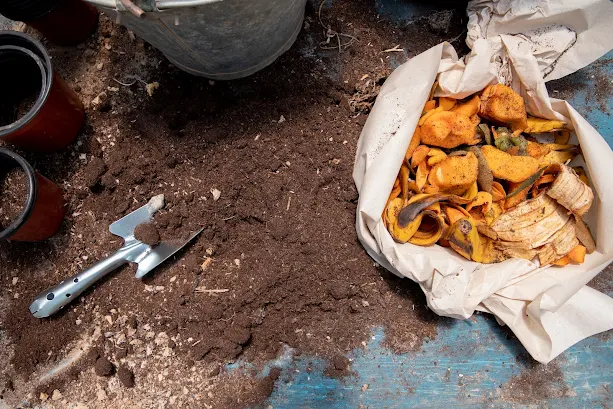In the concrete jungles of urban living, one often overlooked opportunity lies in the abundance of organic waste generated daily. Urban composting offers a sustainable solution to divert food scraps from landfills and transform them into nutrient-rich soil amendments for gardens. From apartment balconies to community gardens, anyone can participate in this eco-friendly practice and reap the rewards of garden gold. In this comprehensive guide, we'll explore the ins and outs of urban composting, from tips for getting started to the advantages and potential challenges.
1. Getting Started with Urban Composting:
Urban composting doesn't require vast expanses of land; it can be done in small spaces like balconies, patios, or even kitchen countertops.
Tips:
Choose a suitable composting method based on space, time commitment, and desired outcomes. Options include vermicomposting (using worms), bokashi composting (fermentation), or traditional aerobic composting. Select a durable, odor-proof composting bin or container to contain food scraps and facilitate decomposition.
Advantages:
Urban composting reduces waste sent to landfills, decreases greenhouse gas emissions from organic waste decomposition, and produces nutrient-rich compost for soil enrichment.
Disadvantages:
Limited space and potential odor issues may pose challenges for urban composting, and proper maintenance is necessary to prevent pests or odors.
2. Types of Composting Methods:
Urban composters can choose from various composting methods, each offering unique benefits and considerations.
Tips:
Vermicomposting involves using composting worms to break down food scraps into nutrient-rich vermicompost. Bokashi composting utilizes anaerobic fermentation to decompose organic waste quickly. Traditional aerobic composting relies on microorganisms to decompose organic matter in the presence of oxygen.
Advantages:
Different composting methods offer flexibility for urban dwellers with varying space constraints, time commitments, and preferences. They all contribute to reducing waste and producing valuable compost for gardens.
Disadvantages:
Each composting method has its specific requirements and potential challenges, such as temperature control, moisture levels, and odor management.
3. What to Compost and What to Avoid:
Not all organic waste is suitable for composting, and certain materials may attract pests or cause odors if added to compost bins.
Tips:
Compostable materials include fruit and vegetable scraps, coffee grounds, eggshells, tea bags, yard trimmings, and shredded paper. Avoid composting meat, dairy, oily foods, pet waste, and non-biodegradable materials like plastics or metals.
Advantages:
Properly composting organic waste diverts it from landfills, reduces methane emissions, and produces nutrient-rich compost for enriching the soil and supporting plant growth.
Disadvantages:
Composting inappropriate materials can attract pests, create odors, or result in incomplete decomposition, leading to compost quality issues.
4. Managing Compost Piles and Bins:
Effective management of compost piles or bins is essential for successful urban composting, ensuring proper decomposition and minimizing odors or pest problems.
Tips:
Maintain the right balance of green (nitrogen-rich) and brown (carbon-rich) materials in compost piles to facilitate decomposition. Turn or aerate compost piles regularly to promote oxygen circulation and speed up decomposition. Monitor moisture levels and adjust as needed to maintain a damp but not soggy environment.
Advantages:
Proper compost pile management optimizes decomposition rates, minimizes odors and pests, and produces high-quality compost for gardening.
Disadvantages:
Neglecting compost pile management can result in slow decomposition, foul odors, or infestations by pests like rodents or flies.
5. Harvesting and Using Compost:
Harvesting compost from finished piles or bins allows urban gardeners to reap the rewards of their composting efforts and enrich their soil with nutrient-rich organic matter.
Tips:
Compost is ready for use when it resembles dark, crumbly soil and has an earthy smell. Use a compost screen or sifter to remove any large particles or undecomposed materials before using compost in garden beds or containers. Apply compost as a top dressing, soil amendment, or mulch to improve soil fertility, structure, and water retention.
Advantages:
Harvesting and using compost complete the composting cycle, closing the loop on organic waste recycling and providing numerous benefits for soil health and plant growth.
Disadvantages:
Improperly harvested compost may contain undecomposed materials or pathogens, and excessive use of compost can lead to nutrient imbalances in soil.
Urban composting empowers individuals to take proactive steps towards reducing waste, enriching soil, and cultivating greener, more sustainable communities. By following the tips and techniques outlined in this guide, urban dwellers can turn food scraps into garden gold, transforming waste into a valuable resource for urban agriculture and gardening. Whether you're composting on a balcony, rooftop, or community garden plot, your efforts contribute to a healthier environment and a brighter future for generations to come.

